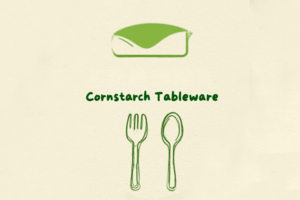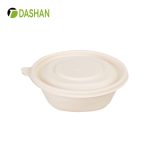DASHAN cornstarch tableware is biodegradable, compostable, and eco-friendly, decomposing in 60–90 days at home or 30–60 days in industrial composting. Ideal for takeout, catering, and everyday use, it reduces plastic waste and supports sustainable practices.
In today’s world, sustainability is no longer an optional consideration—it’s an expectation. Businesses, consumers, and governments alike are demanding environmentally responsible alternatives to traditional single-use plastics. Among these alternatives, cornstarch-based tableware has emerged as a practical, eco-friendly solution. DASHAN, a leading manufacturer of biodegradable tableware, offers a comprehensive line of products designed for restaurants, takeout services, catering, and personal use. From clamshell boxes to bowls, plates, cups, and cutlery, DASHAN’s cornstarch tableware is not only functional but also fully compostable under the right conditions.

Understanding how long these products take to decompose is crucial for both environmental planning and waste management. It affects everything from how businesses manage food packaging waste to how consumers dispose of leftover tableware responsibly. In this article, we will explore the science behind cornstarch tableware decomposition, factors that influence the breakdown process, proper disposal methods, and the environmental benefits of choosing DASHAN products.
What Is Corn starch Tableware?


Cornstarch tableware is crafted from renewable plant-based materials. The main ingredient, cornstarch, is combined with natural fibers and molded under heat and pressure into plates, bowls, cups, clamshell boxes, and cutlery. Unlike traditional plastic tableware, which can take hundreds of years to degrade, cornstarch tableware is designed to break down naturally, leaving minimal environmental impact.
DASHAN’s product range includes:
-
Clamshell Boxes: Perfect for takeout and fast food meals, keeping food fresh and separated.
-
Takeout Boxes: Multi-compartment boxes suitable for complex meals or portion control.
-
Bowls: Heat-resistant bowls for soups, noodles, and hot dishes.
-
Salad Boxes: Lightweight containers for salads and fresh produce.
-
Plates: Single or divided, suitable for catering or everyday use.
-
Cups: Food-safe cups for hot and cold beverages.
-
Cutlery: Knives, forks, and spoons that are sturdy yet biodegradable.
These products are non-toxic, safe for food contact, and compatible with both home and industrial composting.
The Science of Decomposition
The decomposition of cornstarch tableware occurs primarily through microbial action. Microorganisms in composting environments feed on the starch-based polymers, breaking them down into water, carbon dioxide, and organic matter. This process effectively returns the materials to the natural cycle without leaving harmful residues.
The rate of decomposition can vary widely depending on several environmental factors, including:
-
Temperature: Higher temperatures promote microbial activity and faster decomposition.
-
Moisture: Adequate moisture is essential for microbial growth and enzymatic activity.
-
Oxygen: Aerobic conditions support decomposition, while anaerobic environments, like sealed landfills, slow the process significantly.
-
Microbial Diversity: The presence of diverse microorganisms capable of metabolizing cornstarch speeds up the breakdown.
Under optimal conditions, DASHAN cornstarch tableware can decompose within 60 to 90 days in home composting setups and 30 to 60 days in industrial composting facilities. In contrast, conventional plastic utensils can persist in the environment for hundreds of years, highlighting the environmental advantage of switching to biodegradable alternatives.
Factors That Influence Decomposition Time
Understanding the variables that affect how quickly cornstarch tableware breaks down is important for businesses and consumers looking to optimize disposal practices.
-
Composting Environment: Industrial composting facilities maintain controlled temperature, moisture, and microbial activity, which ensures faster decomposition. Home composting may take longer due to less optimal conditions.
-
Material Thickness: Thicker plates or clamshell boxes may take longer to decompose than thinner items. DASHAN products are designed to balance durability with environmental friendliness.
-
Food Residue: Items contaminated with oils, sauces, or proteins may slow microbial breakdown. Rinsing or cleaning tableware before composting is recommended.
-
Aeration: Turning compost piles regularly allows oxygen to penetrate, enhancing microbial activity and accelerating decomposition.
-
Local Climate: Temperature and humidity variations affect the rate of natural decomposition. Warmer, humid climates support faster microbial action compared to dry, cool regions.
Proper Disposal Methods for Maximum Efficiency
To ensure cornstarch tableware decomposes efficiently, proper disposal is essential. DASHAN provides guidance for both home and commercial users:
Home Composting
-
Break down large items into smaller pieces to increase surface area.
-
Maintain adequate moisture, ideally 50–60% water content.
-
Ensure sufficient airflow by turning compost piles regularly.
-
Decomposition usually occurs within 60 to 90 days.
Industrial Composting
-
Use certified industrial composting facilities where temperature, aeration, and microbial activity are optimized.
-
Decomposition can take 30 to 60 days under these conditions, faster than home composting.
Avoid Landfills
-
While cornstarch tableware can technically degrade in landfills, the lack of oxygen and moisture significantly slows the process.
-
Composting is strongly recommended to maximize environmental benefits.
Environmental Benefits of Choosing DASHAN Cornstarch Tableware

-
Reduced Plastic Pollution: Every switch from plastic to biodegradable cornstarch reduces the accumulation of persistent plastic waste in landfills and oceans.
-
Support for Circular Economy: Properly composted tableware converts into nutrient-rich organic matter, which can enrich soil and support agriculture.
-
Lower Carbon Footprint: The production and disposal of cornstarch-based products generally generate fewer greenhouse gas emissions than conventional plastics.
-
Compliance with Environmental Regulations: Many cities and countries have implemented bans or restrictions on single-use plastics. DASHAN products help businesses comply with these policies.
-
Consumer and Brand Appeal: Eco-conscious consumers are increasingly making purchasing decisions based on sustainability. Using DASHAN cornstarch tableware can enhance brand reputation and customer loyalty.
Practical Applications
DASHAN cornstarch tableware is versatile and suitable for multiple contexts:
-
Restaurants & Takeout: Multi-compartment takeout boxes and clamshell containers ensure meals are served fresh while reducing plastic waste.
-
Catering & Events: Biodegradable plates, bowls, and cutlery allow large events to minimize environmental impact.
-
Schools & Institutions: Cafeterias can incorporate sustainable tableware and composting programs to educate students and staff.
-
Retail & Food Delivery: Coffee shops, salad bars, and meal-kit services benefit from eco-friendly packaging options.
By integrating cornstarch tableware into everyday operations, businesses can contribute significantly to sustainability goals.
Social Media Trends and Awareness
Social media plays a crucial role in educating consumers about sustainability. Platforms such as TikTok, Instagram, and Facebook showcase eco-friendly practices, promote challenges, and highlight brands that prioritize environmental responsibility. By featuring DASHAN’s cornstarch tableware in videos, posts, and campaigns, businesses can increase awareness of biodegradable alternatives and inspire more sustainable behavior.
Conclusion
Knowing how long cornstarch tableware takes to decompose is essential for making environmentally responsible decisions. DASHAN provides a high-quality, biodegradable solution that balances durability, functionality, and sustainability. From clamshell boxes and bowls to cups, plates, and cutlery, DASHAN products ensure convenience without compromising the planet.
By following proper disposal practices, whether through home composting or industrial facilities, consumers and businesses can minimize waste, reduce plastic pollution, and support circular economy principles. Choosing DASHAN cornstarch tableware is not just a purchase—it is a commitment to a cleaner, greener, and more sustainable future.
References
-
InNaturePack – Cornstarch Packaging or Bagasse Tableware? A Practical Comparison
-
This comparison highlights the decomposition timelines of cornstarch packaging, stating that under proper composting conditions, decomposition can occur within 90 to 180 days. It also discusses factors affecting decomposition rates, such as heat resistance and composting conditions.
-
Source: innaturepack.com
-
-
EcoClicky – What Are the Stages of Decomposing Biodegradable Tableware?
-
This article explains the stages of decomposition for biodegradable tableware, noting that under optimal composting conditions, cornstarch-based tableware can fully decompose within 3 to 6 months. It also discusses the benefits of composting for soil enrichment.
-
Source: ecoclicky.com
-
-
PackNode – Revolutionizing Food Packaging: The Rise of Bagasse and Cornstarch Tableware
-
This article discusses the environmental benefits of cornstarch tableware, including its compostability and biodegradability. It emphasizes the importance of proper disposal methods to ensure effective decomposition and reduce environmental impact.
-
Source: packnode.org
-
-
PackNode – Cornstarch Cutlery: A Sustainable Solution to Plastic Pollution
-
This article highlights the benefits of cornstarch cutlery as an eco-friendly alternative to plastic utensils. It discusses the decomposition timeline under industrial composting conditions and the environmental advantages of using biodegradable materials.
-
Source: packnode.org
-
-
Dr.Bio – Compostable Cutlery: A Sustainable Alternative
-
This resource provides information on compostable cutlery made from cornstarch, noting that it typically decomposes within 3–6 months in industrial composting facilities. It also addresses questions about the safety and suitability of cornstarch cutlery for hot foods.
-
Source: Dr.BioD
-
-
Entrepreneur India – Production of Biodegradable Tableware from Corn Starch
-
This article outlines the production process of biodegradable tableware from cornstarch, highlighting the use of renewable materials and the environmental benefits. It also discusses the decomposition properties of cornstarch-based products.
-
Source: entrepreneurindia.co
-
Frequently Asked Questions (FAQ)
Q1: Are DASHAN cornstarch products microwave-safe?
A1: Yes, they can safely withstand microwave heating for hot meals.
Q2: Can these products be frozen?
A2: Yes, cornstarch tableware maintains its integrity in cold storage or freezing conditions.
Q3: How quickly do they decompose in landfills?
A3: Decomposition in landfills is slow due to low oxygen levels; composting is recommended for faster breakdown.
Q4: Can home composting achieve full decomposition?
A4: Yes, with proper temperature, moisture, and aeration, decomposition occurs within 60–90 days.
Q5: Are these products safe for food contact?
A5: Yes, DASHAN cornstarch tableware is non-toxic, food-safe, and fully biodegradable.




